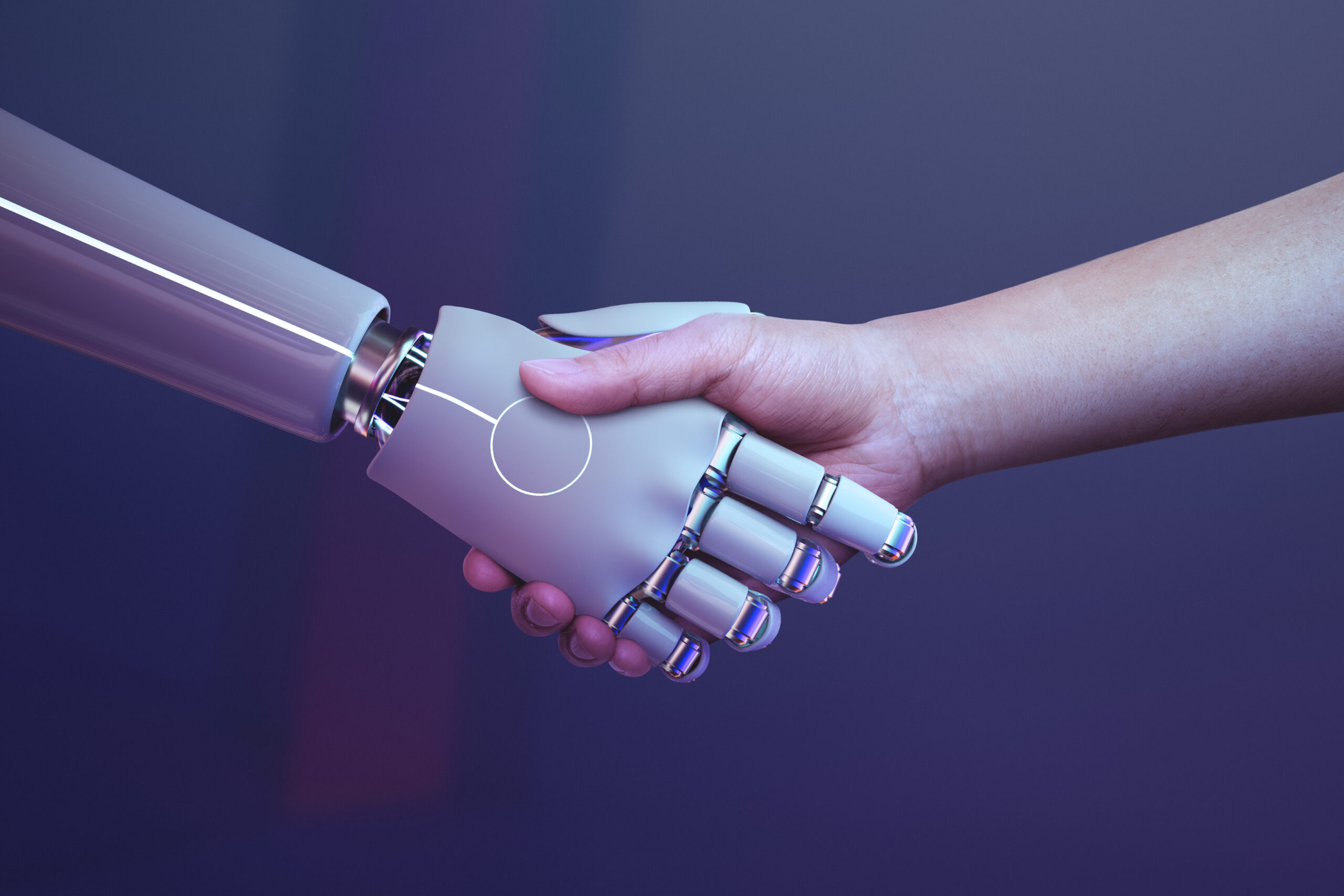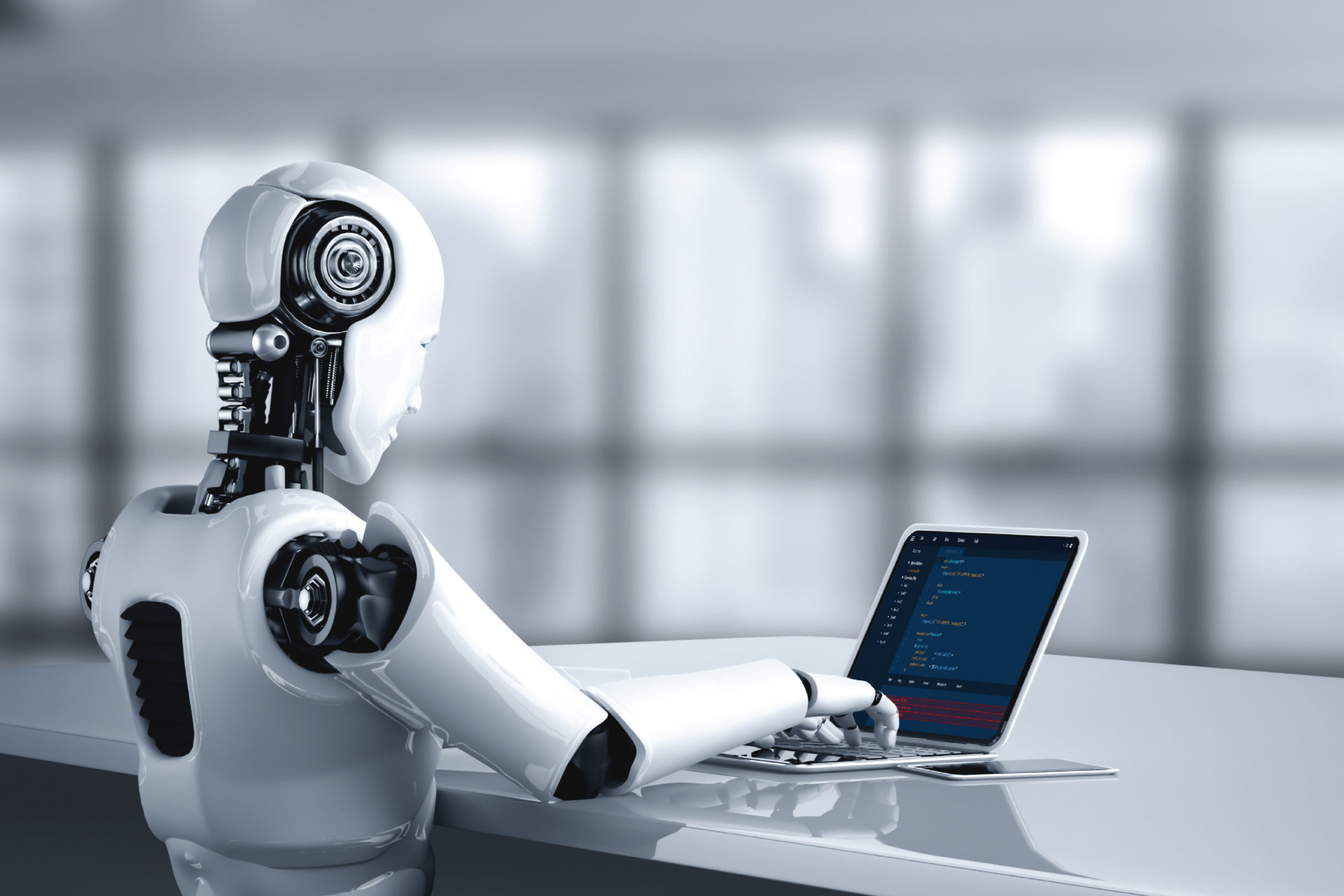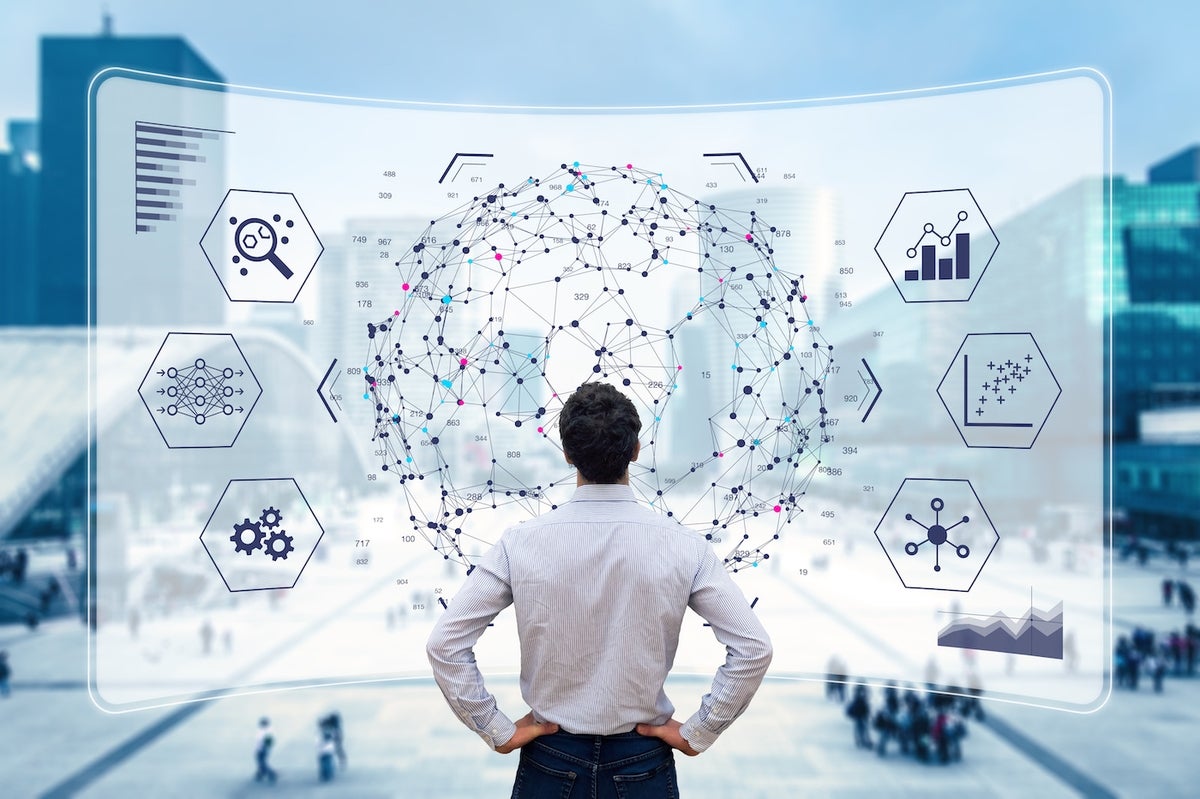The Future of Work is Here: AI & the Tech World
- Tony Camme
- July 3, 2023

Artificial intelligence (AI) is reshaping the tech industry, driving transformative changes in the way we work. From automating routine tasks to enabling groundbreaking insights, AI is unlocking new possibilities and powering cutting-edge technologies. As the future unfolds, AI’s role in the tech industry will be pivotal, redefining work paradigms and fostering a world driven by innovation.
Now read that back again. Did you notice that the first paragraph of this article was written by AI? Probably not. All that was written there is factually correct. It sounds good on paper, and is compelling enough to include in this article. But it was written by an AI engine called ChatGPT after it was asked to, “write an introductory paragraph for an article about AI being the future of work in the tech industry.”
Aside from writing introductory paragraphs for blog articles, AI is used in a wide range of applications, from automating tasks to analyzing data and making predictions. The technology used in self-driving cars, personalized customer support experiences and remote medical diagnoses is also powered by AI. It is fundamentally changing the way we work, and essentially, the future is here.
AI tools are projected to generate over $2.9 trillion in corporate value over the next few years. In order to get a piece of that pie, it’s important to reskill and upskill to keep up with the rate of change. In this article, we’ll take a look at how AI is set to impact software engineering, data science, and data analytics specifically.
AI is Changing the Way We Work
I’m sure you’ve seen the articles with headlines that read, “AI Will Take Your Job,” or something to that effect. While this may be true, it’s not the full story.
By 2025, it is projected that around 85 million jobs will be replaced by AI. This is a scary prospect until you realize that, over the same period of time, AI is expected to create roughly 97 million new jobs. In order to tap into the jobs that the robot revolution will create, workers need to learn how to master these new technologies by upskilling or reskilling. It can be as simple as doing some research on your own, or taking an online course, like those offered through ALX Global.
The professionals who can adapt, upskill and reskill successfully will be rewarded with an abundance of work opportunities. The key is keeping your ear to the ground and to be aware of changes as they happen.
AI Empowers Software Engineers

The role of a traditional software engineer will always be necessary. AI won’t replace their job, but rather augment it and open up a world of possibilities that otherwise wouldn’t be possible.
Today, AI is used to analyze and process data, to make predictions and identify trends. This helps software engineers already – by automating menial tasks, software engineers can focus on more complex and creative problem solving.
How software engineers can use AI
AI has the potential to help software engineers be more productive, creative, and effective at their jobs. In order to stay ahead of the curve and, more importantly, reach the full potential of what is possible with software, software engineers need to embrace AI.
Here are some of the ways the software engineers can leverage AI:
Streamlining software development processes
In software development, there are a lot of time-consuming tasks that don’t necessarily need to be performed by a human. With AI, a software engineer can automate tasks like code generation, testing, and debugging. By identifying bugs and suggesting solutions, AI improves accuracy, enhances efficiency, reduces time and costs, and ultimately leads to the development of high-quality software products.
Automating repetitive tasks
Software engineers also have to perform repetitive tasks such as code reviews and documentation. By leveraging AI, these tasks can be automated, freeing up time for engineers. This automation ensures that code remains up-to-date, comprehensive documentation is maintained for future reference, and overall software quality is enhanced.
Enhancing productivity
With complex algorithms, AI tools can quickly sift through data without the need for an engineer to do so themselves. From fixing bugs to providing important insights from patterns in the data, AI can be used in this way to not only improve the quality of the software, but also to increase overall productivity and efficiency.
Software users also benefit from AI
While most of us aren’t software engineers – not yet, at least! – we all deal with software on a daily basis. From automated customer support bots to the user interface of our smartphones, software is all around us all the time.
When AI is introduced into software engineering, the end result also benefits users. Here are a few ways that software users also benefit from AI:
- Personalized experiences: Using predictive analytics, algorithms, and machine learning, AI can recommend products or services to users that are most relevant to them. It can also automatically update user interfaces to accommodate a user’s specific preferences. For example, you can set your phone to tell you about the weather and remind you of your schedule for the day as soon as you turn off your alarm each morning!
- Improved customer service: An automated chat bot that can answer customer needs in real time can provide users with 24/7 support, resolving customer issues quickly and efficiently.
- More accurate, informative results: When users type queries into search engines, the sheer volume of results can be overwhelming and often make it difficult for users to find exactly what they need. Using AI, a user’s data can be analyzed to tailor search results to their preferences, increasing the likelihood of them getting the results they want.
- More efficient, productive workflows: In non-tech fields, AI can help users automate tasks in their software that makes work more efficient and productive.
- More secure, reliable software: Users don’t have to know the intricacies of the software they use. Software with built-in AI can instead identify and fix vulnerabilities on its own and also protect itself against cyber attacks.
While AI will surely continue to impact software engineering, it is more likely to augment the work of software engineers rather than replace them entirely. While it is possible for AI to do things like automate repetitive tasks and optimize code, the specific skills and expertise of a software engineer will remain crucial for designing complex software systems, ensuring quality, and driving innovation. In short, software engineers can leverage AI to make their jobs easier and more interesting.
AI is Revolutionizing Data Science

The job of a data scientist includes a lot of repetitive tasks that are used to extrapolate information from data. These repetitive tasks are not the most interesting or insightful and can make data science feel a bit dull and boring.
Using AI, however, these dull parts can be automated. Here are some of the ways data scientists can use AI in their work:
- Automating data cleaning: AI can be used to automatically identify and correct errors in datasets. This can prevent crucial errors and save data scientists a lot of time.
- Generating insights: Data scientists can use AI programs to scan data to create insights that would otherwise be impossible to identify manually.
- Predicting trends: AI software can collect customer data and find patterns or trends that help businesses make more strategic decisions.
- Personalizing experiences: Using machine learning and AI, companies can use the data collected from users to recommend products or services that are tailored to the users’ particular needs.
Data Science and the Internet of Things
The Internet of Things (IoT) refers to a network of objects – ”things” – that connect and exchange data with other devices on the internet using sensors and software. With the advancements in technology, AI, and machine learning, more and more devices are transforming into “smart” devices. This ranges from household objects like your TV or refrigerator, all the way to complex industrial tools. All of these appliances can share and collect data on their own – the physical and digital worlds become one.
The IoT generates a huge amount of data that can be very useful for a data scientist. Using this data, they can train AI and predictive technologies to help make IoT devices more responsive and better at making decisions.
An example of this is using AI to look at data from IoT devices to predict when the machine is likely to break down. Knowing this information, users can schedule maintenance before the breakdown, saving businesses money and improving the overall quality of their product too.
AI is also being used to develop new IoT devices that are increasingly more intelligent and responsive. For example, AI-powered security cameras can now detect and track people and objects in real-time by monitoring specific facial or object signatures. Impressive, right?
As more and more devices become connected, vast amounts of data get created. It is the role of a data scientist to figure out how best to use that data to further push the boundaries of what is possible with technology.
AI Enhances Data Analysis

As big data continues to get bigger, the sheer volume of data and its complexity have all escalated to unprecedented levels. Traditional analytical techniques driven only by human brains are starting to get overwhelming.
In recent years, AI has emerged as a transformative force, helping us to extract more meaningful insights and make better-informed decisions from this data deluge. Using the power of AI, the field of data analytics has changed too.
How AI is used in data analysis
Here are some ways that AI is used to revolutionize the way data analysts derive insights and make informed decisions:
- Automating tasks: Data cleaning, feature engineering, and model training can now be run by AI, freeing up a data analyst’s time to set up more complex dashboards or build better data visualizations. Automating time-consuming tasks makes data analysis more fun and interesting.
- Identifying patterns: By carefully analyzing large swathes of data, AI can identify trends and patterns that would otherwise be impossible – or at least very difficult – to identify manually.
- Making predictions: AI is able to generate forecasts about future events based on historical data gathered and analyzed. This helps businesses make decisions about anything from product development, to marketing, to resource allocation.
- Personalizing experiences: By analyzing user data, AI can help personalize experiences for users by recommending products or services that would appeal to them.
Here are some specific examples of how AI is being used in data analytics today:
- Netflix: By analyzing your viewing history, Netflix can accurately recommend movies and TV series to you. The convenience of only being shown things that you might like can help save time when there is so much content to parse through. It also helps you discover new things you might not have otherwise found.
- Amazon: As you browse through the site, it collects data on things that you click on, pages you stay on, and items that you add to your cart. AI can then use this data to personalize advertisements and product recommendations for you.
- Google: The more times you use Google, the more accurate your search results will be for what you are looking for. By keeping track of your search data, Google can use AI to accurately predict which search results you will find most helpful or useful.
- Spotify: AI can sift through song data, compare it to your personal listening history data, and then recommend playlists or create radio stations based on the things you like. This makes it much easier to discover new music because the algorithm can predict what you might like before you even know it.
- Microsoft Office: Features like predictive text and spell check enhance productivity when writing. AI in Microsoft Office can even help automatically complete tasks or finish your sentences when you’ve got writer’s block.
Overall, AI enables faster and more efficient processes and workflows, empowering professionals in the tech world to achieve higher productivity and accuracy. Moreover, organizations benefit from streamlined development cycles, valuable insights from complex datasets, and data-driven decision-making. Embracing AI in these fields is essential for staying ahead in the workforce today.
Reskill & Upskill with ALX Global

With the ever-evolving tech industry, staying competitive on the job market requires tech professionals, both current and aspiring, to continuously adapt to ongoing advancements. To keep pace with these changes, reskilling or upskilling through IT certifications is a valuable option to consider. Here are some advantages to consider:
- Increased job opportunities: Tech won’t stop advancing anytime soon. Having the relevant tech certifications and knowledge can give you a competitive edge and open up new job opportunities for you.
- Higher salaries: Tech professionals with certifications typically earn higher salaries than those without.
- Improved job satisfaction: Working in tech can be very rewarding. Having the skills and knowledge to do your job well means you’ll be more satisfied with your work.
- More opportunities for advancement: As new fields emerge in tech, getting proper certifications can open up new opportunities for advancement within your current company. It can even lead to a better job at a new company.
At ALX Global, we stand on the cutting-edge of tech, providing online tech courses that help prepare your career for the future. Whether you’re just getting started or have been in the industry for years, it’s never too early or too late to improve your skills.
Our courses include:
- Intro to Software Engineering: This course will teach you the fundamentals of software engineering, including object-oriented programming, data structures, algorithms, and testing.
- Data Science: Here, you will learn how to collect, analyze, and interpret data using statistical methods and machine learning.
- Data Analytics: In this course, you will be equipped with skills in building and evaluating data models, using machine learning algorithms, and creating data visualizations.
Whether you’re upskilling or reskilling, ALX Global’s courses are sure to prepare you for a career in the future of work in the tech industry. As tech continues to evolve and change, so should you! Reserve your seat now, you won’t regret it.
Summary
In today’s rapidly evolving tech landscape, AI is spearheading a hugely transformative shift. As AI continues to advance, it is poised to have a profound impact on various industries, and will become an even more integral part of our daily lives.
Businesses in all industries are recognising the potential power of AI, with a majority investing in developing and integrating AI into their business models. The future of work is definitely here, with AI at the forefront. Now more than ever, it is imperative to upskill and learn how to integrate AI into your workflow in order to thrive in this new digital era.
ALX Global offers online courses that acknowledge the importance of tech advancements like AI and will equip you with the necessary tools and skills to thrive in whatever industry you choose. Get in touch with ALX Global today to find the right course that will future-proof your career.
FAQs
What is AI?
Artificial Intelligence (AI) is the field of computer science that is focused on creating intelligent systems that can reason, learn, and act autonomously. AI uses datasets and machine learning to enable complex problem-solving, mimicking human intelligence.
Will AI replace humans as workers?
AI has the potential to automate certain tasks and replace humans in specific job roles, but it is unlikely to completely replace humans as workers. While AI can excel at repetitive, data-driven tasks, it still lacks the creativity, emotional intelligence, and complex problem-solving abilities that humans possess. Instead of replacing humans, AI is more likely to augment and enhance human capabilities, transforming the nature of work rather than eliminating it.
AI can free up humans from mundane and repetitive tasks, allowing them to focus on higher-level responsibilities that require creativity, critical thinking, and interpersonal skills. It can also enable humans to make more informed decisions by providing data-driven insights. In some cases, AI may even create new job opportunities as it drives innovation and the development of new industries.
Ultimately, the future of work with AI lies in collaboration between humans and intelligent machines, leveraging their respective strengths for mutual benefit.
What are examples of AI?
Some examples of AI include virtual assistants like Siri and Alexa, autonomous vehicles such as self-driving cars, recommendation systems used by platforms like Netflix and Amazon, facial recognition technology, chatbots that provide customer support, advanced data analytics tools, language translation services, and image recognition algorithms.
AI is also employed in medical diagnosis, fraud detection systems, and robotic automation in manufacturing. These are just a few examples, showcasing the diverse applications of AI across various industries and domains.